Caissie Canine Instruction: Puppy Behaviours to Nip in the Bud Early
- caissiecanineinstr

- Aug 26, 2024
- 2 min read

We begin this week’s “RUFF TAILS” featuring a beautiful Blood Coon Hound named Everett.

Everett is a 4-year-old Blood/Coon Hound mix that came from a hoarding situation. He was 1 when he was rescued and spent 2 years at Ruff Start, New Beginnings retreat waiting for his fur-ever home. In August 2023 he finally found his home.
He settled in quickly, with his new pawrents, his older sibling Rusty and a few feline friends. Everett is a very smart boy that loves his plush toys. He never gets tired of hearing “good boy” because all he wants is to please his humans.

We are hopeful that with Paul’s help we will be able to understand his behaviours and help Everett be the very best dog he wants to be.
Welcome to Doggie Dialogue

Having a new puppy is a wonderful new beginning for the both of you. Most puppies love to “nibble” and this can look cute, however puppy teeth are sharp and you want to nip this in the bud early.
When your puppy nips you, your pants, or hands, tell them in a firm voice “ouch” and offer them an alternative with a chew toy.
Your firm voice will startle them, and it helps them to learn that this behaviour is not o.k.

Puppies get excited, especially when new people arrive to visit. Puppies love to jump up, however as they grow this behaviour might not be ideal anymore.

To teach your puppy not to jump up, approach your puppy calmly. Every time they try to jump up take a step forward at the same time. This will cause your pup to lose their balance and not be able to stay up on you.
When you are consistent with this, they will learn that jumping up is not o.k.
Chewing is expected, in puppyhood, because your new pup is teething. Chewing on cords or furniture is not acceptable. We recommend picking a command, such as “out” or “off”, in a firm voice, every time your puppy chews on something they should not. Providing your puppy with good chew toys will help.


All dogs bark, as this is how they communicate, however excessive barking is unneeded. You need to let your puppy know when it’s not time to bark. Use a consistent command like “quite” and wait until they have stopped barking to praise and reward. This will be a long process, but over time your puppy will start to understand. Be patient and stay consistent.
Should you need any assistance with your new puppy, please feel free to reach out to Paul anytime.




Comments